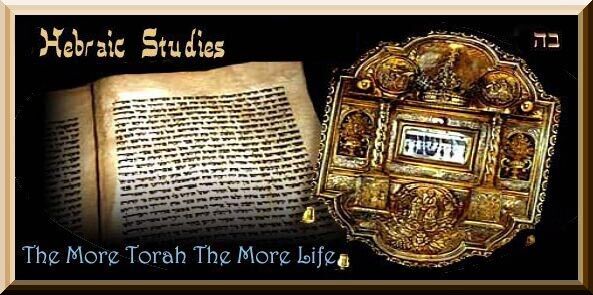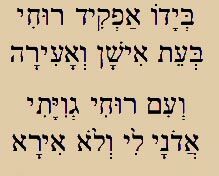Overcoming Fear - Parashat Chukas
Please Note: Firefox and some other Search Engines may not be suitable
Use Google Chrome for this Web Page to load perfectly!

Please do NOT visit this site on Shabbat or on a
Please Note: On this page I will show the four letter
blessed *“Memorial
Name” of the Almighty in Ivrit - ![]() - Y-H-V-H, which we usually pronounce as “Adonai” or “HaShem”. At all
times treat the most blessed Name with sanctity and when we even see the Name,
we should say “blessed be His Sanctified Name.”
- Y-H-V-H, which we usually pronounce as “Adonai” or “HaShem”. At all
times treat the most blessed Name with sanctity and when we even see the Name,
we should say “blessed be His Sanctified Name.”
*“This is My Name forever, and this is My memorial to all generations.” Shemot - Exodus 3:15.
On this site I will mostly use a version based on the “Jewish Publication Society” Tanakh (JPS)
Parashah Chukas
Be’midbar - Numbers
Chapters 19 to 22
With
Rabbi Reuven Ben-Avraham.
I am going to call these verses … “Our focal point”:
“And they turned and went up by the way
of Bashan; and Og
the king of ![]() said unto Moshe: ‘Fear him
not’” Be’midbar - Numbers 21:33-34 (JPS
- Jewish Publication Society version of the Torah).
said unto Moshe: ‘Fear him
not’” Be’midbar - Numbers 21:33-34 (JPS
- Jewish Publication Society version of the Torah).
D’var Torah:
Thirty-eight of the forty years of the Shemot - Exodus journey go by virtually unnoticed in this Torah portion. These years must have been filled with the same kinds of struggle, strife, and unrest that characterize the two years that the Torah speaks about. Yet at the same time what happens during these two years remains somewhat of a mystery to us, and how Moshe handles the challenges that arise during this time can only be surmised.
As the journey nears its conclusion, the
Israelites begin to meet and battle nations on the outskirts of the Promised
Land and they defeat Sihon, king of the Amorites, and
even the great king of
The most prominent feature of Moshe’s leadership throughout his time as guide of our people is the fearlessness with which he leads them. From striking the brutal Egyptian taskmaster dead to staring down Pharaoh; from placing himself physically between Elohim, blessed be He, and the Israelites after Acharon - Aaron and the people build the Golden Calf to patiently handling the overwhelming task of managing the millions of Israelites on their wilderness journey, Moshe is an exemplar of courageous leadership unlike any other. And here in this parashah, when called upon to serve as commander-in-chief, he succeeds brilliantly.
This is what makes the content of Numbers 21:33–34, our focal point, so surprising. Why does Elohim feel the need to instruct Moshe not to be afraid? Have we ever witnessed any sign of fear from Moshe before?
We see self-doubt in Moshe at the outset of the Book of Shemot. When Elohim calls to him at the Burning Bush, Moshe hesitates to take up the mantle of leadership. And in fact, in Shemot 2:14, after Moshe strikes down the taskmaster, the Torah tells us that “Moshe was frightened, and thought: Then the matter is known!” Moshe fears that he may be punished for his actions.
In a study I gave once on Be’midbar
I suggested that we could understand Moshe’s fear, before he spoke to
Elohim. And, we can comprehend his fear when he witnesses Elohim’s power
for the first time, at the Burning Bush. But here, thirty-eight years later,
after Elohim entrusted him with the mission of leading the Israelites into
freedom, after he leads them across the Red Sea, and after he sees Elohim
face-to-face on ![]() Elohim, blessed be
His Sanctified Name, and the last trait we would attribute to Moshe is
apprehension.
Elohim, blessed be
His Sanctified Name, and the last trait we would attribute to Moshe is
apprehension.
But if the Torah records Elohim’s telling Moshe not to be afraid, we can infer that, indeed, Moshe is scared that Og and his people might defeat the Israelites after all.
This passage shows us that Moshe’s
anxiety and self-doubt are never totally eliminated. Although he may wear a
confident expression to lead the people, hiding his trepidation and a little
fear from them, and perhaps even from himself but Elohim, the All-Knowing, sees
into the depths of his heart. And knowing that Moshe is still a man, and is capable of some fear, “And ![]() said unto Moshe: ‘Fear him
not’”
said unto Moshe: ‘Fear him
not’”
If we really think about it, perhaps it is much the same with us, for we grow and move forward from stage to stage. We evolve from the concerns of our youth and face the ever-present curves that life tends to throw at us. At best, our strengths drive us to reach greater heights in order to embrace challenges, and dream of promised lands and challenges yet unseen or unknown.
At the same time, like Moshe, we try to hide our weaknesses, finesse our shortcomings, and “power through” those things that may have haunted us in life.
Elohim, blessed be He, calls upon Moshe to use
his extraordinary gifts to lead the people through the wilderness. However,
Elohim also knows that Moshe like any human has cracks and empty places that
may hide some fear. But at all times, ![]() Elohim, blessed be His Sanctified Name,
stands by Moshe, bringing him comfort when those cracks threaten him.
Elohim, blessed be His Sanctified Name,
stands by Moshe, bringing him comfort when those cracks threaten him.
And so may it be with us. We are called by our humanness and our strength in Him to stretch, strive, create and build. May we search deeply within ourselves to find strengths that we never knew we had. And in those darker times, when our fears threatens to overcome us, let us remember that our Elohim is always nearby, to bring us that extra strength, to hear the cries our hearts just cannot hide.
By the way, first of all let me assert my firm belief that the only thing we have to fear, and of course fear itself is always; nameless, unreasoning and it brings unjustified terror which paralyses when you need your strength!
What do the last two verses of ‘Adon Olam’ mean to you? Have there been times in your life when you felt that you had put your soul or your body in Elohim’s hands?

“Beyado Afkid Ruchi Beais Eeshan Veoeera
Ve’eem Ruchi Geviyati
Adon-nay Li Velo Eera”
“Into his
hand I commit my spirit.
When I sleep, and I awake.
And with my
spirit, my body
![]() (YAH) is with me, I will
not fear”
(YAH) is with me, I will
not fear”
![]()

For those who have a yearning to learn more about the Torah and grow in being a good and faithful Jew, there are many valuable studies on Hebraic Studies enter the index below. If you have any questions you are welcome to email me.
And please remember our motto seen on the logo
at the top of this page: “The
More Torah, the More Life”, for ![]() Elohim, blessed be His Sanctified Name, is the
one who gave us our Life!”
Elohim, blessed be His Sanctified Name, is the
one who gave us our Life!”
Rabbi
Return to our MAIN PAGE or go to our Main Index
?
![]()

© Copyright - 1989 - 2022 © hebraicstudies - All rights reserved

